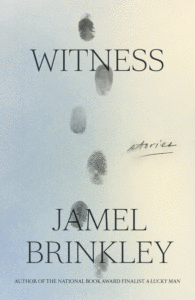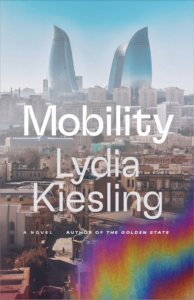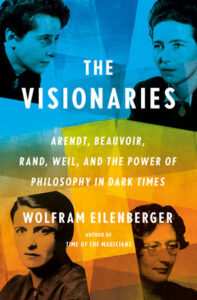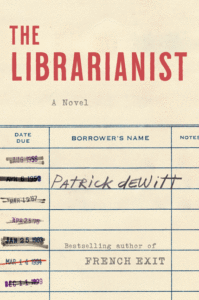
5 Book Reviews You Need to Read This Week
"Tapping into the sticky stuff of humanity, each story is a gift"
Our fivesome of fascinating reviews this week includes Mateo Askaripour on Jamel Brinkley’s Witness, Katy Waldman on Ann Patchett’s Tom Lake, Michael Frank on Patrick deWitt’s The Librarianist, Apoorva Tadepalli on Lydia Kiesling’s Mobility, and Jennifer Szalai on Wolfram Eilenberger’s The Visionaries.
Brought to you by Book Marks, Lit Hub’s “Rotten Tomatoes for books.”

“Jamel Brinkley’s sophomore story collection, Witness, opens with an epigraph from James Baldwin, describing how thin the line is between a witness and an actor: ‘Nevertheless,’ Baldwin concludes, ‘the line is real.’ But is it? Over the course of 10 splendidly thought-provoking stories—set in Brooklyn and featuring animal rescue volunteers, florists, ghosts, UPS workers and a host of other characters—Brinkley shatters Baldwin’s thesis, masterfully demonstrating that witness and actor are one and the same. … Brinkley pierces the superficial and obvious—that what meets the eye is all there is to see—by displaying a more nuanced portrait of how we perceive and are perceived … Stylistically, the beginnings of these stories are akin to being thrust into a moving current—Brinkley doesn’t waste time on unnecessary setup or trivial fluff. His smooth prose rips and slips down the page, getting right to the point … Brinkley is a writer whose versatility knows no boundaries. He can make you laugh, cry, contemplate life’s deepest questions, remember what it was like to be a child, and feel the warmth, or chill, of your own family history. Tapping into the sticky stuff of humanity, each story is a gift of the highest quality, reminding us that we are all both in the audience and on life’s stage, even if we don’t know it.”
–Mateo Askaripour on Jamel Brinkley’s Witness (The New York Times Book Review)

“Most of Patchett’s work is directly or indirectly about the experience of being stuck in a difficult family. She is a connoisseur of ambivalent interpersonal dynamics within closed groups … Patchett is interested in how people, in families and elsewhere, come to terms with painful circumstances; how they press beauty from constraint, assuming artificial or arbitrary roles that then become naturalized, like features of the landscape … The early pandemic, with its claustrophobic intimacy, seems almost tailor-made for Patchett’s interests. Tom Lake is about being caught in an intractable family situation … The ingredients have been assembled for a wistful meditation on mothers and daughters learning to handle the seasons of their lives … But the novel’s alchemical transformation of pain into peace feels, at times, overstated … As Tom Lake goes on, the determined positivity begins to feel slightly menacing, or at least constrictive … there’s something subversively wise and self-aware about the book’s investment in its own fantasy. Tom Lake, the fiction, seems conscious of its status as a magical place, a locus of gentle make-believe. Even as Patchett validates Lara’s performance of contentment, she appears to know that behind the artifice lies a more complicated truth.”
–Katy Waldman on Ann Patchett’s Tom Lake (The New Yorker)
“DeWitt has set himself a difficult task, one of the most challenging that faces a fiction-maker: to render compelling the life of a putatively dull man. The Librarianist meets this challenge by keeping those still waters defiantly still, even as life carries Bob into situations of varying vividness and complexity … The Librarianist is unyielding in its defiance of our arguably too-set expectations about how novels should depict human interiority in times of flux, crisis, or transition. Bob Comet is no comet; he is a steady, low-voltage star, a pinprick of light who only partially awakens to the complexity of his own life. By the end, I came to admire Patrick deWitt’s commitment to the mission he has set himself: to render a figure who is not beaten up by loss or reformed by insight, a man who remains, nearly always, resolutely himself.”
–Michael Frank on Patrick deWitt’s The Librarianist (Times Literary Supplement)

“In one of the most remarkable and terrifying scenes in Lydia Kiesling’s new novel, Mobility, the patriarch of a family-owned Texas oil company tells his staff: ‘We don’t think in economic cycles, we don’t think in election cycles … in this industry, we think in earth time. Geologic time. There’s no short-term problem we can’t wait out.’ The oil business, as we see through the experiences of the protagonist, Bunny, is untouchable—removed from all human intention but everywhere, inescapable, looming unmoved over all the characters and all the Earth’s ‘short-term problems’ … At its core, Mobility is about how political questions fit into a life. Adult Bunny is the average bland, liberal American woman: White, earnest, eager for material comfort. She doesn’t want to be a jerk, but she doesn’t want to have to think too hard about social or economic justice; she believes that Barack Obama is a ‘symbol of the victory of good over evil’ and that the Occupy Wall Street protesters in Zuccotti Park ‘would be happier if they got jobs’ … Kiesling leaves readers with a troubling awareness of the role we play in our ecological future, and a bleak sense that the new normal is like the old one: simultaneously overwhelming and underwhelming. But Bunny and her mother continue to appreciate their patch of earth. On one excessively hot day, Maryellen pushes aside a shriveled fig plant to reveal a tiny green sprout. In Kiesling’s rendering of humanity and our planet, life simply goes on. And Bunny is still here, focusing on signs of life in her small garden rather than mass extinction, hopeful about the future.”
–Apoorva Tadepalli on Lydia Kiesling’s Mobility (The Washington Post)

“Rand is the id of this book—proudly selfish and grandiose, supremely confident of her own importance and mercilessly disdainful of others. Despite her adamant elitism, she poured her efforts into novels and screenplays, pursuing precisely those forms of mass entertainment that would allow her to reach the very public she derided. In 1941 she wrote an open letter to Americans that began by insulting them … At the other extreme from Rand is Weil—not the book’s superego but its self-abnegating martyr. Tiny and sickly, she demanded to work in factories in order to have ‘direct contact with life,’ finding the jobs so depleting and soul-crushing that she ended her yearlong stint on the assembly line even frailer than before … Eilenberger is an energetic guide to these philosophers’ ideas, though it’s clear that he holds Weil’s writings in special esteem … The Visionaries ends with Weil’s death in a British sanitarium, in 1943; the official cause was listed as ‘cardiac failure.’ She had also stopped eating, asking her nurses to send the milk she was supposed to drink to people starving in France. The coroner’s report includes a postscript: ‘The deceased did kill and slay herself by refusing to eat whilst the balance of her mind was disturbed.’ Reading Eilenberger’s account, I felt both moved and confounded by some of Weil’s doomed commitments. But then, he might say that in my ‘honest bafflement’ I was looking to the ‘great other’ for something more familiar to me than she could ever provide.”
–Jennifer Szalai on Wolfram Eilenberger’s The Visionaries: Arendt, Beauvoir, Rand, Weil, and the Power of Philosophy in Dark Times (The New York Times)
Book Marks
Visit Book Marks, Lit Hub's home for book reviews, at https://bookmarks.reviews/ or on social media at @bookmarksreads.





















